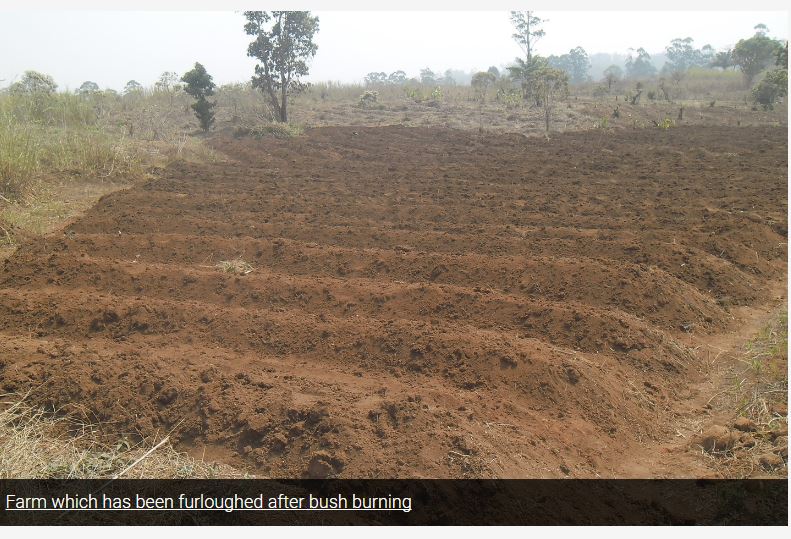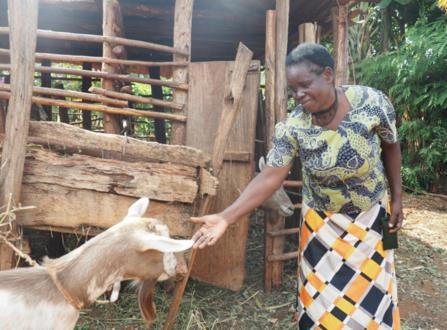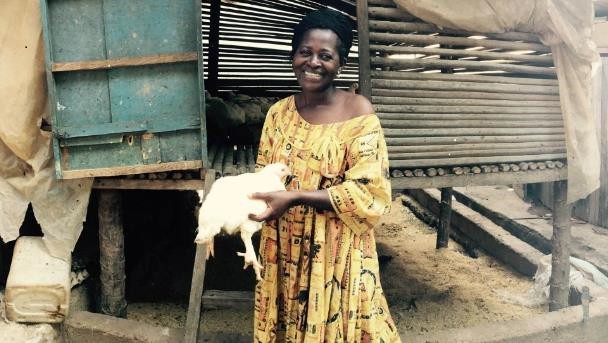Abi Fall in Cameroon empowering women in rural areas
By Denise Nanni and
Milena Rampoldi, ProMosaik. The next organisation struggling for human rights
we would like to introduce you today is Abi
Fall in Cameroon, working for the education and empowerment of girls and
women in rural communities in Cameroon. We would like to thank Sylvester for
the detailed answers about the engagement of Abi Fall.
Milena Rampoldi, ProMosaik. The next organisation struggling for human rights
we would like to introduce you today is Abi
Fall in Cameroon, working for the education and empowerment of girls and
women in rural communities in Cameroon. We would like to thank Sylvester for
the detailed answers about the engagement of Abi Fall.

How was Abi Fall founded
and what are its objectives?
and what are its objectives?
Abi Fall was founded in 2010, by a group of friends who saw it necessary
to assist the livelihood of the rural communities within Cameroon, especially women and girls. It was then legalized in January
2012.
to assist the livelihood of the rural communities within Cameroon, especially women and girls. It was then legalized in January
2012.
It also work on the empowerment of women, Good governance, democracy and environmental production.
Abi Fall’s main objective of is to evolve alternative strategies of education
and
empowerment of rural women so as to enable them to participate, as equal citizens, in the
economic, political and social sustainable development
of the rural society in Cameroon.
and
empowerment of rural women so as to enable them to participate, as equal citizens, in the
economic, political and social sustainable development
of the rural society in Cameroon.
What are the main problems that rural communities face in Cameroon?
In the rural communities in Cameroon males have opportunities in construction, trade,
transport, storage, and services, while these are mostly denied to rural females. Which means opportunities must be created to enable them to acquire the skills necessary for entering these newly emerging occupations.
transport, storage, and services, while these are mostly denied to rural females. Which means opportunities must be created to enable them to acquire the skills necessary for entering these newly emerging occupations.
In the field of primary education, the system calls for much overhaul since centralized curricula, heavy text–books, centralized teacher–recruitment,
orthodox pedagogy, unsuitable school–timings and vacations, rigid and
distrustful supervision and administration, have been the main hurdles in its reaching the rural masses. Besides, the primary system is traditionally connected with secondary general education. Productive skills and the
cultural contexts of education are ignored. The solution now perceived by
Cameroon’s educational thinkers and planners is liberation of the education
system through a movement for adult literacy and non–formal alternatives for meeting the urgent as well as long–term needs of the rural and tribal people,
especially women. Science and technology
components are visualized as essential educational elements for future–oriented education. Life–long learning through alternatives in education, especially continuing education
for
diverse needs and groups, is, therefore, the main concern of Cameroonian reformers.
orthodox pedagogy, unsuitable school–timings and vacations, rigid and
distrustful supervision and administration, have been the main hurdles in its reaching the rural masses. Besides, the primary system is traditionally connected with secondary general education. Productive skills and the
cultural contexts of education are ignored. The solution now perceived by
Cameroon’s educational thinkers and planners is liberation of the education
system through a movement for adult literacy and non–formal alternatives for meeting the urgent as well as long–term needs of the rural and tribal people,
especially women. Science and technology
components are visualized as essential educational elements for future–oriented education. Life–long learning through alternatives in education, especially continuing education
for
diverse needs and groups, is, therefore, the main concern of Cameroonian reformers.
In what ways do you promote women‘s economic empowerment?
Abi Fall promote empowerment of rural women through innovative
strategies for life–long learning in response to this concern, which it fully shares.
strategies for life–long learning in response to this concern, which it fully shares.
Abi Fall
emphasizes that
rural
women’s mindset
of ‘dependency’ must
be changed so that they become conscious of their abilities to change themselves,
their families, and their community. Abi Fall believes that empowerment would make them becoming creative, self–dependent, individuals. Some of the action will provide
insights into
the methodology
of
enabling the oppressed to reflect upon their predicaments so as to find ways of learning new skills and approaches to become effective partners in development, to become ‘‘subjects‘’ of transformation through arousal of self–esteem. Abi
Fall’s projects, would witness changes such as:
emphasizes that
rural
women’s mindset
of ‘dependency’ must
be changed so that they become conscious of their abilities to change themselves,
their families, and their community. Abi Fall believes that empowerment would make them becoming creative, self–dependent, individuals. Some of the action will provide
insights into
the methodology
of
enabling the oppressed to reflect upon their predicaments so as to find ways of learning new skills and approaches to become effective partners in development, to become ‘‘subjects‘’ of transformation through arousal of self–esteem. Abi
Fall’s projects, would witness changes such as:
(a)
Non–formal primary education for rural girls.
Non–formal primary education for rural girls.
(b)
Science and technology
for rural women.
Science and technology
for rural women.
(c)
Promoting health, family welfare, and community development with focus
Promoting health, family welfare, and community development with focus
on women and girls.
(d)
Training of rural women as Animators for women’s empowerment and community development.
Training of rural women as Animators for women’s empowerment and community development.
The following action oriented objectives are what Abi Fall will like to pursue:
(a)
To organize educational and empowerment programmes for girls and
women
To organize educational and empowerment programmes for girls and
women
(b) To train resource persons, animators and trainers for implementing activities visualized in the objectives.
(c)
To conduct and promote experimentation, innovations and research in the problems and programmes of empowerment of rural women.
To conduct and promote experimentation, innovations and research in the problems and programmes of empowerment of rural women.
(d) To integrate socio-economic activities with concern for health and
environment protection, in the light
of the rural
women’s cultural contexts.
environment protection, in the light
of the rural
women’s cultural contexts.
(e) To invest science and technology in women’s education and empowerment
programmes to enable them to acquire scientific temper and to enable their family and community to engage in the process of sustainable development
programmes to enable them to acquire scientific temper and to enable their family and community to engage in the process of sustainable development
through the ‘reflection-action’ process.
What are your ongoing projects?
Some of our projects are to help women tending the garden and making strides in financing,
growing and selling their produce together.
But
because we realized many of the women lamented losses in soil fertility, detrimental pest infestations, and the expense of chemical inputs, Abi Fall had to train
the
women on how to develop compost manure which was new for the
community, but which will meet their needs on multiple levels. It provided
an environmentally–friendly gardening technique that would enrich the soil,
and
the women’s group became interested in the health benefits of organic produce.
Best
of all, it was also free. The women
in
their farms and
community had all the raw inputs they needed to create a compost pile—
green nitrogen–rich weeds they clear from their farms, dead grasses and other debris from harvesting corn or wood ash from cooking fires or soil with local microbes, and water.
growing and selling their produce together.
But
because we realized many of the women lamented losses in soil fertility, detrimental pest infestations, and the expense of chemical inputs, Abi Fall had to train
the
women on how to develop compost manure which was new for the
community, but which will meet their needs on multiple levels. It provided
an environmentally–friendly gardening technique that would enrich the soil,
and
the women’s group became interested in the health benefits of organic produce.
Best
of all, it was also free. The women
in
their farms and
community had all the raw inputs they needed to create a compost pile—
green nitrogen–rich weeds they clear from their farms, dead grasses and other debris from harvesting corn or wood ash from cooking fires or soil with local microbes, and water.
Working between three villages, Abi Fall’s and its counterpart trained 144
farmers in producing compost, organic pest repellents and pest deterrents.
All
of the products used inexpensive local ingredients.
farmers in producing compost, organic pest repellents and pest deterrents.
All
of the products used inexpensive local ingredients.
They also discussed management, budgeting and marketing with seven agriculturalist groups, further strengthening the connections between farm and
market. As a result of
the trainings, one women’s group
constructed two
compost piles at their group’s garden and built six piles at one member’s home garden. Motivated women’s groups are the key to improving soils and food
security in Cameroon.
market. As a result of
the trainings, one women’s group
constructed two
compost piles at their group’s garden and built six piles at one member’s home garden. Motivated women’s groups are the key to improving soils and food
security in Cameroon.

Madame Nanyongo of Mbonge Sub Division in Cameroon playing with her goats, among others
that she is rearing within her home. She looks for food for the goats feed them and when they
are matured, she sells them and use the money to
feed herself, her children and pay their fees.
She
also use the money to take care of the health
situation of her family and herself. This makes her
proud to talk within her community when others are boosting
of themselves.
that she is rearing within her home. She looks for food for the goats feed them and when they
are matured, she sells them and use the money to
feed herself, her children and pay their fees.
She
also use the money to take care of the health
situation of her family and herself. This makes her
proud to talk within her community when others are boosting
of themselves.
 Mrs. Debora living in Big Nganjo, is a rural
Mrs. Debora living in Big Nganjo, is a ruralsmallholder farmers who is keeping village chickens. She takes care of the production
system and number of eggs to be hatched, controls labour involve, taking different results from hens. She takes care of all improvement in her poultry production system, which involves investment in time, equipment and funds which should never be
overestimated. Also protecting from
predators and bad weather.
Do you cooperate with local authorities and institutions? If yes, how?
For all our activities, we involve the local authorities, as they are the ones who encourage both the women and girls to attend seminars, training sessions we organize, by making announcements to inform
their communities about our presence and what we want to do.
their communities about our presence and what we want to do.
They are also involved in the monitoring and evaluation of the project activities. We involve these local authorities and other community base organization in sustainability of Abi Fall’s activities.


